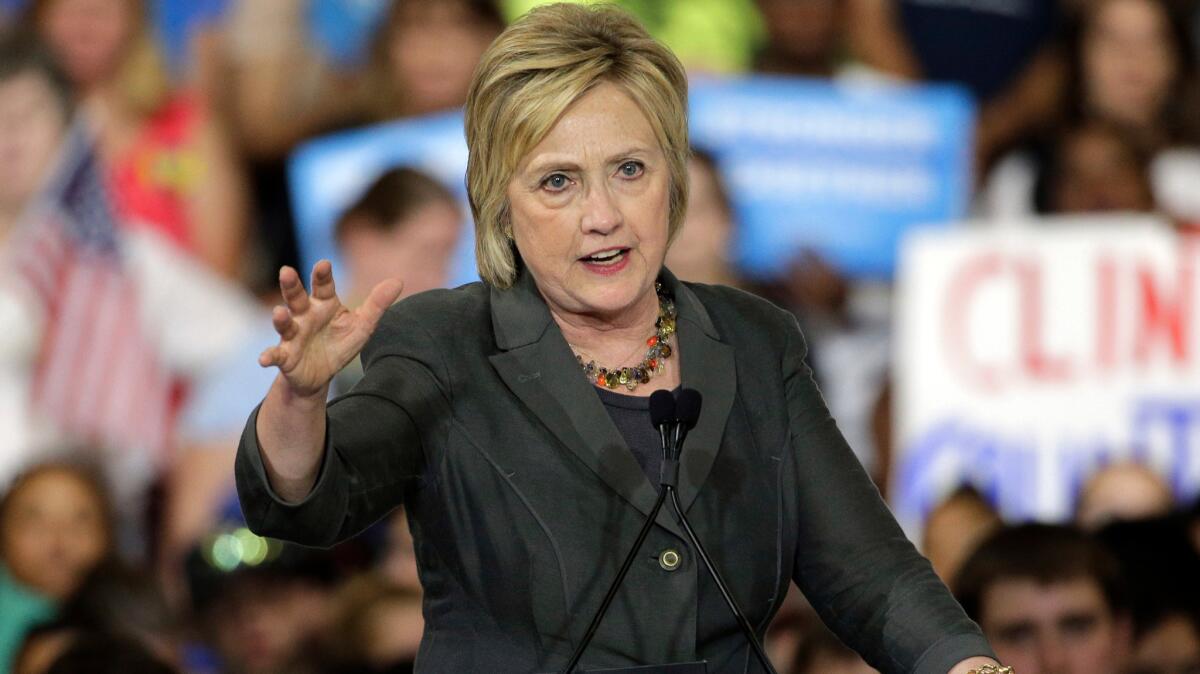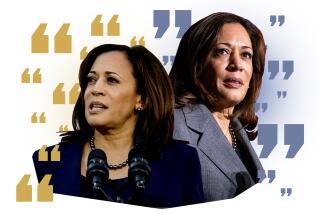Clinton has staked out many liberal positions, but will it quell unrest among progressives?

Reporting from Philadelphia â Though Hillary Clintonâs choice of running mate renewed charges from the left over the weekend that she is a centrist â even a âcorporatistâ â who posed as progressive to get through a hard-fought Democratic primary, her actions on the campaign trail are hardly those of a candidate racing back to the center.
Clinton heads into the Democratic National Convention starting Monday in Philadelphia as one of the partyâs most liberal nominees in recent history, tacking so far in the direction of progressives that some are still astonished by the positions she has taken.
âTwo years ago, it was almost unimaginable that Hillary Clinton would be campaigning on debt-free college, expanding Social Security, breaking up âtoo big to failâ banks and all these other progressive issues,â said Adam Green, a founder of the Progressive Change Campaign Committee. âIt is the sign of our times and her recognition of where the country has moved.â
Perceptions of Clintonâs ideology will factor big in whether the Democrats can make a strong showing of unity this week as their convention opens, or see grumblings from the huge delegation backing Vermont Sen. Bernie Sanders grow into a loud and disruptive convention hall protest. Sanders supporters are angry about Clintonâs decision to put Virginia Sen. Tim Kaine, rather than a progressive standard-bearer like Massachusetts Sen. Elizabeth Warren, on the ticket, as well as internal Democratic National Committee emails disclosed by WikiLeaks that suggested the party plotted to undermine Sanders during the primary. Those disclosures triggered the abrupt resignation Sunday of DNC Chairwoman Debbie Wasserman Schultz, whom the Sanders campaign has wanted gone for months.
Convention planners hope to neutralize that anger with the help of spirited prime-time addresses bolstering Clinton from both Sanders and Warren. Others who embody the progressive agenda will also speak, including the mothers of nonwhite children killed in police custody and an immigrant activist brought to the country illegally as a child.
Those close to Clinton are irked by the suggestion that the effort is window dressing. Despite her high-profile role in the proudly centrist administration of her husband, and the generosity Wall Street has showered upon her through campaign contributions and eye-popping speaking fees, Clinton has a long history of crusading for liberal causes that they point to.
âThese are long-held beliefs she has held her whole life,â said Neera Tandeen, who was Clintonâs policy advisor during her 2008 campaign for president. âThis is a woman who began her work in advocacy 30 years ago at the Childrenâs Defense Fund, ensuring African American children have the same opportunities as all children.â
Clinton continued to move leftward even as her campaign pivoted off the primary and into the more conservative electorate that will vote in November. In recent weeks, she has embraced a vast expansion of the Affordable Care Act and an ambitious plan for debt-free college and refused to back off her criticism of institutional racism in the criminal justice system despite the mass shootings of police in Dallas and Baton Rouge, La.
The day after Clinton picked Kaine as her running mate, the erstwhile free-trade champion from Virginia swiftly joined her opposition to the massive Pacific trade deal reviled by the left, mollifying activists and robbing President Obama of a crucial vote to move the deal through Congress before he leaves office. AFL-CIO President Richard Trumka declared that the free-trade skepticism projected by the Clinton-Kaine ticket âsignifies the beginning of a new era.â
Both Sanders and Republican nominee Donald Trump undeniably freed Clinton to move in that progressive direction â or pushed her there, as their supporters insist. Sanders won state after of state by promising big new government programs including free college for everyone and socialized medicine. Trump crushed his GOP opposition by fashioning himself as an economic populist who would tear apart trade deals like the one with Pacific nations Kaine now opposes.
Together, the events signal a shift in the ideology of the American electorate.
Regardless of their registration, voters are more impatient with the status quo, more frustrated with concentration of wealth at the top, and generally more liberal than during previous presidential contests. Americans are now as likely to identify themselves as very liberal on social issues as they are to identify themselves as very conservative for the first time since Gallup began tracking such ideology in 1999. Back then, those surveyed were nearly twice as likely to self-identify as firmly conservative.
Clintonâs railing against inequities in the criminal justice system from the start of her run delighted liberals, but it hardly put her in an extreme partisan corner. The issue had already been embraced by some of the countryâs most conservative governors, struggling with the surging prison populations that resulted from the tough sentencing provisions put in place during the 1990s, including by President Clinton when he signed his landmark crime bill.
âThereâs greater bipartisan consensus now,â said Benjamin Jealous, the former president of the NAACP and a prominent Sanders supporter, who noted even the conservative Koch brothers are heavily involved in promoting sentencing reform. Jealous said he does not see Clinton toning down her talk about race and abuse by police even as Trump runs as a âlaw and orderâ candidate in the style of Richard Nixon, who successfully tapped the anxieties of white Americans during another time when racial violence dominated the headlines.
âThe countryâs demographics are very different now than they were four or five decades ago,â Jealous said.
Even some of the leading centrists who guided Clintonâs husband away from liberalism are now encouraging her to be looking left. The most prominent among them may be Bill Clintonâs former Treasury secretary, Lawrence H. Summers. Long detested by progressives, the economist now warns of an erosion of democracy if unions are not strengthened and government does not pursue policies that force wage growth.
Clintonâs aggressive agenda is less about ideological labels than meeting voters where they are right now, said Rep. Eric Swalwell, a 35-year-old Bay Area Democrat who is pushing college affordability legislation as he struggles with his own $100,000 of education debt.
âCall it progressive, call it reform, call it whatever you want,â he said. âBut there is a whole generation that needs something different from government. She is not shying away from it.â
Times staff writer Chris Megerian contributed to this report.
Follow me: @evanhalper
Under pressure from Bernie Sanders, Democrats poised to change how they pick nominees
On eve of convention, embattled DNC chair Debbie Wasserman Schultz says sheâll step down
More to Read
Get the L.A. Times Politics newsletter
Deeply reported insights into legislation, politics and policy from Sacramento, Washington and beyond. In your inbox three times per week.
You may occasionally receive promotional content from the Los Angeles Times.











